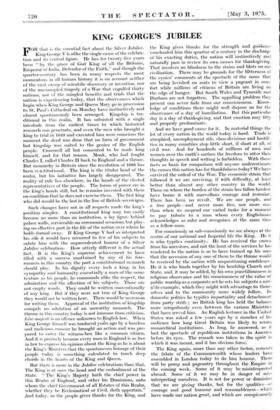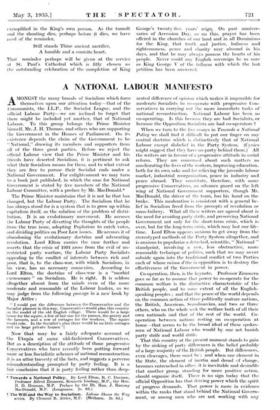KING GEORGE'S JUBILEE
FOR that is the essential fact about the Silver Jubilee. King George V is alike the single cause of the celebra- tion and its central figure. He has for twenty-five years been " by the grace of God King of all. the Britains, Emperor of India, Defender of the Faith," and though the quarter-century has been in many respects the most momentous in all human history it is on account neither of the vast sweep of scientific discovery or invention, nor of the unexampled tragedy of a War that engulfed thirty nations, nor of the mingled benefits and trials that the nation is experiencing today, that the observances which begin when King George and Queen Mary go in procession to St. Paul's Cathedral on Monday have instinctively and almost spontaneously been arranged. Kingship is tra- ditional in this realm. It has subsisted with a single interlude from the earliest times to which historical research can penetrate, and even the men who brought a king to trial in 1649 and executed him were conscious the moment the deed was done that no form of government but kingship was suited to the genius of the English people. Cromwell all but consented to be made king himself, and for that reason. Monk, who had fought Charles I, called Charles II back to England and a throne. But monarchy in Britain since the revolution of 1688 has been constitutional. The king is the titular head of the realm, but his initiative has largely disappeared. The reality of rule lies elsewhere, in the hands of the elected representatives of the people. The forms of power are in the king's hands still, but he remains invested with them on condition that he does not exercise them. The first king who did would be the last in the line of British sovereigns.
Such changes have not in all respects made the king's position simpler. A constitutional king may too easily become no more than an institution, a lay figure behind palace walls, serviceable on ceremonial occasions but play- ing no effective part in the life of the nation over whom he holds formal sway. If King George V had so interpreted his role it would have occurred to few of his subjects to salute him with the unprecedented honour of a Silver Jubilee celebration. How utterly different is the actual fact. It is the King's supreme • achievement to have filled with a success unattained by any of his fore- runners in this country the part a constitutional monarch should play. In his dignity every inch a king, in his sympathy and humanity essentially a man of the same texture as his people, he commands alike the respect, the admiration and the affection of his subjects. Those are not empty words. They could be written conventionally of any king. But if they were not true of King George they would not be written here.. There would be no reason for writing them. Approval of the institution of kingship compels no adulation of an unworthy monarch. The throne in this country today is not immune from criticism: Lest-inajede is an offence unknown to English law. When King George himself was traduced years ago by a baseless and malicious rumour he brought an action and was pre, pared to enter the witness-box like a common citizen. And it is precisely because every man in England is as free in law to express his opinion about the King as he is about the King's Ministers that the spontaneous homage of their people today is something calculated • to touch deep chords in the hearts of the King and Queen.
But there is more in the Jubilee celebrations than that. The King is at once the head and the embodiment of the State. " The King's Majesty hath the chief power in this Realm of England, and other his Dominions, unto whom the chief Government of all Estates of this Realm, whether they be Ecclesiastical or Civil, doth appertain." And -today, as the people gives thanks for the King, and the King gives thanks for the strength and guidance vouchsafed him this quarter of a century in the discharge of his exacting duties, the nation will instinctively and naturally pass in review its own causes for 'thanksgiving. That involves no blindness to the stains and blots on our civilization. There may be grounds for the bitterness of the cynics' comments at the spectacle of the sums that are being lavished on seats to view a pageant in com- fort while millions of citizens of Britain are living on the edge of hunger. But South Wales and Tyneside and Durham are not forgotten. The appalling problem they present can never fade from our consciousness. Know- ledge of conditions there might well dispose us for the observance of a day of humiliation. But this particular day is a day of thanksgiving, and that emotion may fitly and properly predominate.
And we have good cause for it. In material things the lot of every nation in the world today is hard. Trade is atrophied, unemployment rife, class-divisions and hostili- ties in many countries stop little short, if short at all, of civil war. And for hundreds of millions of men and women over the earth's surface the freedom to utter their thoughts in speech and writing is forbidden. With those facts as basis for comparison will anyone underestimate the causes this nation has for thankfulness today? We have survived the ordeal of the War. The economic strain that followed it we are surviving, if with difficulty, at least better than almost any other country in the world. Those on whom the burden of the strain has fallen hardest have borne it with marvellous courage and restraint. There has been no revolt. We are one people, and a free people—and never more free, nor more . one. than when we suspend our varied tasks for a moment to pay tribute to a man whom every Englishman acknowledges as ruler and recognizes at the same time as a fellow-man.
For consciously or sub-consciously we see always at the centre of our national and Imperial life the King. He it is who typifies continuity; He has received the crown from his ancestors, and not the least of the services he has rendered to the nation is so to have trained up his sons that the accession of any one of them to the throne would be received by the nation with unquestioning confidence. He it is who binds together by his headship Church and State, and, it may be added, by his own punctiliOnsness in religious observance and his consciousness of the value .of public worship as a corporate act he sets his subjects a.not- able example, which they might with advantageto them- selves and to the community more widely follow. In domestic politics he typifies impartiality and detachment from party strife ; no British king has held the balance more scrupulously even between the various Ministries that have servedhim. An English lecturer in the United States was asked a few years ago by a member of his audience how long Great Britain was likely to: retain monarchical institutions. As long, he answered, as it had the spectacle of republican institutions in America before its eyes. The remark was taken in the spirit in which it was meant, and it has obvious force..
The King again, more than any other .factor,. 'cements the fabric of the Commonwealth whose leaders have assembled in London today to do him honour: There will be pomp and pageantry throughout th'e kmpire in the coming week. Some of it may be misinterpreted abroad. Some of it we may be in danger of -mis- interpreting ourselves. It is not for power or dominion that we are giving thanks, but for the ;qualities-0f courage and good humour and reasonableness=which have made our nation great, and which are conspicuously exemplified in the King's own person. As the tumult and the shouting dies, perhaps before it dies, we have . . , need of the reminder, Still stands Thine ancient sacrifice, A humble and a contrite heart.
That reminder perhaps will be given at the service at St. Paul's Cathedral which is fitly chosen as the outstanding celebration of the completion of King George's twenty-five years' reign. On past anniver- saries of Accession Day, as on this, prayer has been offered in the churches of our land and in all Dominions for the King, that truth and justice, holiness and righteousness, peace and charity may abound in his days, and that he may always possess the hearts of his people. NeVer could any English sovereign be so sure as King George V of the fullness with which the last petition has been answered.















































 Previous page
Previous page